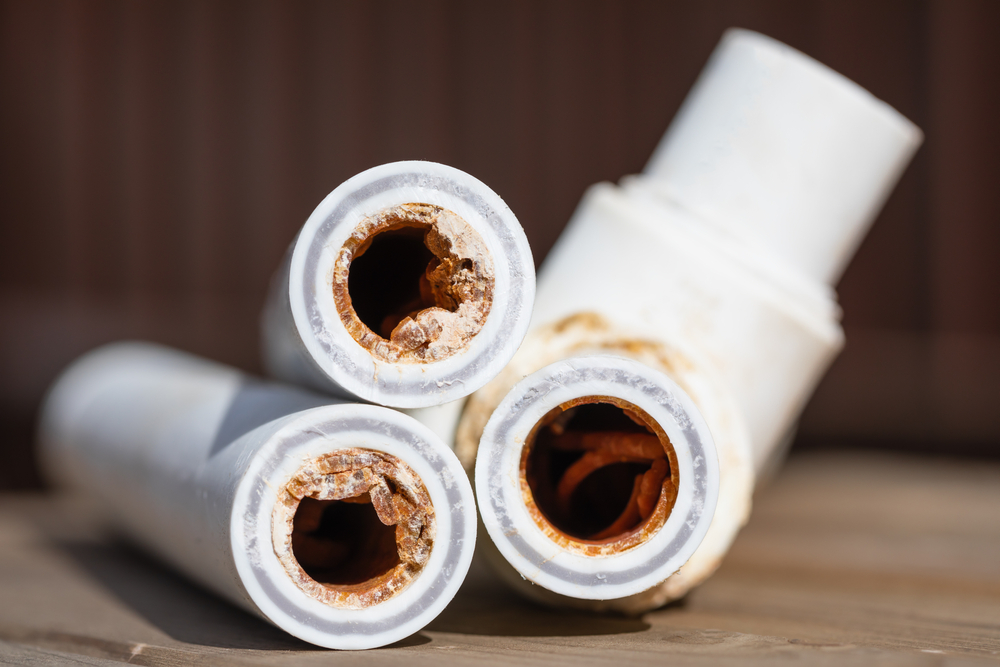Noticing weak water pressure, slow drains, and chalk deposits on your fixtures? Hard water may be the likely cause. Packed with calcium and magnesium, hard water gradually builds up in your pipes, leading to costly plumbing issues if left unchecked.
In this post, we explore the effects of hard water on plumbing and how drain cleaning in Athol, ID, can address hard water buildup.
Hard Water Problems: How It Damages Plumbing Systems
Did you know that hard water minerals can cause clogs? Although it can’t be observed in real-time, minerals accumulate inside pipes.
During a given period, minerals can form stubborn deposits that restrict water flow. This buildup can cause a clogged drain, increased pressure, and even burst pipes.
- Clogs & Reduced Water Flow: Minerals combine with soap scum and grease, leading to tough blockages.
- Pipe Pressure Issues: As pipe diameters narrow, water pressure increases, stressing the system and causing leaks.
- Drainage Slowdowns: Deposits also collect in sewer lines, leading to backups and unpleasant odors.
The Importance of Regular Plumbing Maintenance
Homeowners looking to keep their plumbing in optimal shape should not overlook preventive maintenance. Drain cleaning services can detect early signs of mineral deposits before they cause major damage.
- Drain Cleaning Services: Specialized tools are needed to clear mineral buildup and restore normal flow safely.
- Routine Pipe Inspections: Identifying early signs of hard water damage can prevent expensive repairs.
- Water Testing: Knowing your water’s hardness level helps determine the best treatment solutions.

Solutions for Hard Water Buildup
From manual buildup removal to high-pressure cleaning solutions, hard water issues are not without answers. Here are a few ways of resolving hard water buildup:
- Hydro Jetting: High-pressure water blasts away stubborn accumulations.
- Drain Snaking: A flexible auger manually clears minor blockages caused by mineral buildup.
- Whole-House Water Filtration: This system removes excess minerals before they enter your plumbing.
Hard Water and Skin & Hair Health: What’s the Connection?
Your bathing water may be making your skin feel dry or your hair look dull. The minerals interfere with soap and shampoo, leaving behind residue that strips moisture from skin and hair.
- Dry, Itchy Skin: Hard water prevents soap from fully rinsing off, leading to skin irritation.
- Dull, Brittle Hair: Mineral buildup on hair strands can make it feel rough and lifeless.
- Soap Scum Residue: Leftover soap on the skin can cause breakouts and clogged pores.
Expert Hard Water Tests: Why Professional Testing Matters
DIY hard water test strips can give a general idea of mineral content, but professional testing provides accurate results. Accuracy is more valuable as it can help homeowners choose the best treatment solutions.
- Comprehensive Analysis: Experts can find out the exact levels of minerals in your water.
- Tailored Solutions: Professionals can recommend effective treatment for your home’s plumbing system.
- Early Detection: Identifying high mineral content early prevents major plumbing damage.
Are Your Appliances at Risk? How Hard Water Impacts Home Systems
Hard water can damage pipes and shorten the lifespan of household appliances. This is problematic because seeking replacements for pipes or appliances comes at a premium.
- Dishwashers & Washing Machines: Scale buildup can cause inefficient cycles and early breakdowns.
- Water Heaters: Sediment accumulation increases energy costs as it forces heaters to work harder.
- Coffee Makers & Ice Machines: Mineral deposits clog small water lines, affecting performance and taste.
Hard Water Minerals and Pipe Narrowing: A Growing Problem
As hard water flows through plumbing, calcium and magnesium deposits gradually coat the inside of pipes. This leads to:
- Reduced Pipe Diameter: Buildup causes a gradual decrease in water flow.
- Increased Pressure Risks: Higher pressure accelerates wear and tear on pipes.
- Frequent Clogs: Small particles get trapped more easily, worsening blockages.
How to Get Started: Protecting Your Home from Hard Water Damage
Preventing expensive plumbing issues starts with choosing to be proactive. Here’s what homeowners can do:
- Test Your Water Hardness: Identify mineral levels with a professional test.
- Install a Water Softener: Reduce mineral content before it reaches your pipes.
- Schedule Regular Maintenance: Prevent buildup with routine inspections and cleaning.
- Upgrade Appliances: Look for models with integrated water softeners that can handle hard water.
Although plumbing emergencies are an inevitable part of homeownership, there is no need for you to wait for them to happen. Professional plumbers can help you implement long-term solutions to protect your home’s water supply against hard water.
